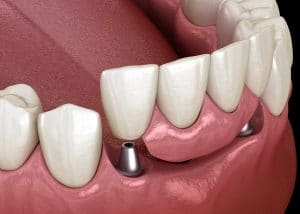 The art of restoring your smile when one or more teeth are compromised is often a simple and direct process. For example, if your tooth is fractured or broken, then a restoration such as a dental crown may likely be able to fix it. However, if one or more teeth are lost, then rebuilding your smile could be more complex. Rather than repairing and preserving your natural tooth structure, the goal is to closely replicate it with a custom-designed tooth replacement.
The art of restoring your smile when one or more teeth are compromised is often a simple and direct process. For example, if your tooth is fractured or broken, then a restoration such as a dental crown may likely be able to fix it. However, if one or more teeth are lost, then rebuilding your smile could be more complex. Rather than repairing and preserving your natural tooth structure, the goal is to closely replicate it with a custom-designed tooth replacement.
Addressing the loss of your teeth
The difference between restoring and replacing a tooth is that, if the tooth is being restored, then it still retains its foundation of healthy, natural tooth structure. If the tooth is lost or extracted, then the tooth and its root will be gone, and the restoration will need a new source of support to successfully restore your smile. A dental implant-supported restoration comes equipped with one or multiple dental implant posts, which are designed specifically to reestablish the functions of your natural teeth roots. This includes offering a greater level of support for your replacement tooth or teeth, as well as reestablishing the stimulation that your teeth roots are responsible for providing your jawbone structure.
The importance of your smile’s foundation
Replacing lost teeth isn’t a new area of professional dentistry. In fact, patients have long relied on restorations such as dental bridges, partials, and full dentures to restore their smiles following tooth loss, and today’s restorations offer a higher level of realism than ever before. However, the art of replacing the lost roots of your teeth has only been possible since the advent of dental implants, which are biocompatible posts that are inserted into your jawbone structure. With the support of one or more dental implant posts, your restoration can benefit from a more lifelike foundation that more closely mimics your natural teeth roots.
Designing implants for different needs
The good news about dental implants is that they can be a good option for many patients who’ve experienced tooth loss, whether their loss involves a single tooth or several of them. Every implant post can be placed individually, and at an angle that’s carefully calculated to offer a maximum amount of support for your dental restoration. For many patients, the implantation of a biocompatible post helps prevent some of the more extensive consequences of tooth loss, including the loss of stimulation that can result in a weakening of your jawbone structure.
Learn more about rebuilding your smile
Dental implants can make rebuilding your smile after tooth loss a more effective process, and they can offer better results at preserving your long-term smile and oral health. To learn more, schedule a consultation by calling the Dental Centre of Conroe in Conroe, TX, today at (936) 441-4600.




